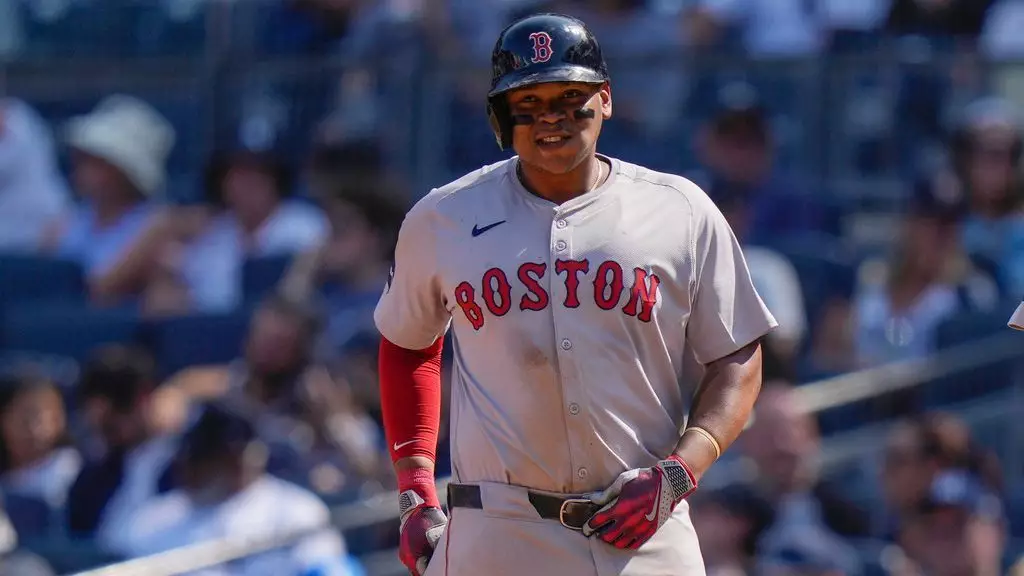Rafael Devers, the formidable designated hitter of the Boston Red Sox, has found himself at the center of a significant dilemma. During a recent press conference, he made it abundantly clear that he is not open to switching positions again—a sentiment worth exploring in the context of player roles and organizational expectations in Major League Baseball. Devers’s reluctance to fill in for Triston Casas at first base following a severe injury to the latter sheds light on broader issues facing professional athletes in today’s high-stakes environment.
After a stellar performance against the Texas Rangers—where he hit a home run and drove in two runs during a decisive win—Devers addressed questions from the press concerning potential positional changes proposed by Red Sox management. The conversation took a turn toward his previous transition from third base to designated hitter, a move that was made after the Red Sox signed star player Alex Bregman. The player’s understandable reluctance to shift roles again raises critical questions about the expectations placed on athletes, particularly when they have already displayed exceptional skill in a specific role.
The Burden of Expectation
For a three-time All-Star like Devers, who finds success and identity as a designated hitter, being asked to adapt to a new position can feel like a betrayal. During spring training, he was told to “put away his glove,” transitioning to a focused role that would maximize his offensive output. This dictated change is a microcosm of how management decisions can clash with the players’ development and self-perception. Given that he has never played first base in the majors, the prospect not only sounds daunting but overwhelmingly unappealing.
His insistence that the Red Sox should look externally for players to fill the gap left by Casas is significant. It demonstrates his understanding that specialization is crucial for excellence. Devers’ defense of his position brings to the forefront the way players should advocate for their roles and trust in their strengths. “They should do their jobs essentially,” he remarked, suggesting that the responsibility lies with management to ensure the team is adequately staffed rather than relying on players to backfill positions they are not suited for. This highlights the significant disconnect that can occasionally exist between player capability and organizational strategy.
Accountability and Athletic Identity
Moreover, Devers’ comments reflect an ongoing struggle between athlete loyalty to their team and personal career development. He expressed frustration about being pulled into a role he has never mastered, emphasizing the risk of burning out athletes who are asked to juggle too many responsibilities. “I don’t feel they stayed true to their word,” he said, reiterating a feeling that resonates with many players who fear losing their identity due to constant reassignments. In essence, why should players be held accountable for filling in diverse roles when their true expertise lies elsewhere?
Devers’ unwillingness to reconsider his stance, even in the face of potential poor production from current first basemen, underscores a commitment to his role. It speaks not only to his confidence in his abilities but also unveils a fascinating interaction between self-advocacy and team dynamics. His life in baseball has shaped him into a player who understands his worth; hence, he won’t compromise his skills for short-term fixes.
The Future of Player Roles
As the modern game evolves and teams face unique challenges, conversations about flexibility within player roles will undoubtedly continue. Devers stands as an example of a player maintaining his convictions in a sport that sometimes rewards versatility over specialization. The notion that one critical player can simply switch gears to fill gaps left by injuries is not only unrealistic but also disheartening for those athletes dedicated to mastering their craft.
The implications of Devers’ position on the Red Sox’s decision-making process could be profound. He is making a statement about self-identity and the acknowledgment that a player’s talent needs recognition and respect. Whether or not the management takes heed, his steadfastness serves as a powerful reminder that athletes are not merely pawns on a chessboard; they are skilled professionals with aspirations, concerns, and rights to define their careers. In a landscape filled with shifts and strategies, Devers’ voice is a critical call for clarity and respect in an industry often mired in ambiguity.

